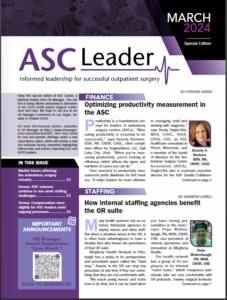
 Subscriber Content Planning eases compliance with CMS emergency preparedness rules
Subscriber Content Planning eases compliance with CMS emergency preparedness rules
As of November of 2017, healthcare providers—including ambulatory surgery centers (ASCs)—receiving reimbursement from the Centers for Medicare & Medicaid Services (CMS) were expected to comply with the 2016 Emergency Preparedness Requirements. And as with most government regulations, there are multiple pages of instructions to dissect and understand to satisfy the…
Management pearls position ASCs for successful growth
The rapid growth in outpatient procedures presents exciting opportunities for leaders at ambulatory surgery centers (ASCs), but also the challenge of accommodating a higher volume and more specialties without sacrificing efficiency and patient safety. That’s why it’s important not to lose sight of the fundamentals in managing an ASC, whether…
 Subscriber Content How many different procedures are right for your ASC?
Subscriber Content How many different procedures are right for your ASC?
When launching a new ambulatory surgery center (ASC), owners must consider a myriad of issues—financing, design, building construction or purchase, regulatory compliance, certification, staffing, and marketing. Underlying all of these considerations are which procedures the center will provide and whether the ASC will be single specialty, like gastrointestinal (GI) or…
 Subscriber Content New ASC credential reflects expertise in infection prevention
Subscriber Content New ASC credential reflects expertise in infection prevention
Licensed healthcare professionals working in ambulatory surgery centers (ASCs) can now earn a Certified Ambulatory Infection Preventionist™ (CAIP™) credential to demonstrate their understanding of the skills and knowledge required to fill the role of an infection preventionist (IP) in an ASC. The new certification program can also help IPs working…
 Subscriber Content Total joints present increasingly attractive option for ASCs
Subscriber Content Total joints present increasingly attractive option for ASCs
The migration of total joint replacements for knees and hips from inpatient hospital ORs to hospital outpatient departments and ambulatory surgery centers (ASCs) is spreading. On November 1, 2017, the Centers for Medicare & Medicaid Services (CMS) bolstered the trend when it approved the removal of total knee arthroplasty (TKA)…
 Subscriber Content Your ASC is for sale--what's next?
Subscriber Content Your ASC is for sale--what's next?
Mergers and acquisitions of ambulatory surgery centers (ASCs) have increased recently, as organizations perceive the opportunities provided by growth markets, and ASCs realize the benefits of having access to a larger provider network, such as a pipeline of patients and more power in negotiating with insurers. Those transactions can have…
 Subscriber Content ASC quality reporting deadlines moved up in 2018
Subscriber Content ASC quality reporting deadlines moved up in 2018
On November 1, 2017, the Centers for Medicare & Medicaid Services (CMS) released its final rule for the 2018 Medicare Hospital Outpatient Prospective Payment System/ASC Payment System and Quality Reporting Programs. In summary, several ambulatory surgery center (ASC) measures (ASC-1 to ASC-14) are unaffected, except that three measures (ASC-5, -6,…
 Subscriber Content Peer review inspires high performance from providers
Subscriber Content Peer review inspires high performance from providers
Peer review is a hot topic in the quality arena as many ambulatory surgery centers (ASCs) strive to create meaningful and sustainable evaluation of their providers. “As a surveyor, I can tell you peer review trips everybody up,” says Ann Geier, MS, RN, CNOR, CASC, chief nursing officer of Surgical…
 Subscriber Content Track ASC metrics to produce a healthy bottom line
Subscriber Content Track ASC metrics to produce a healthy bottom line
Each day seems to bring new tasks for leaders of ambulatory surgery centers (ASCs), adding to their already overflowing plate. One task that can easily fall off that plate is collecting and analyzing metrics, yet failing to do so can have serious financial consequences. OR Manager recently asked ASC leaders…
 Subscriber Content Walk the talk: Words matter when it comes to patient safety
Subscriber Content Walk the talk: Words matter when it comes to patient safety
Every week Ann Shimek, MSN, BSN, RN, CASC, hits the road to communicate about communicating. Shimek is senior vice president of clinical operations at United Surgical Partners International (USPI) in Addison, Texas. She and her team of six clinical nurses travel among USPI’s 21 hospitals and 260 ambulatory surgery centers…


